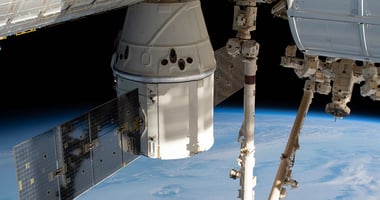You look up at the night sky and watch a tiny dot moving across, it can't be a bird, or a plane,...
Exploring Space to Inspire Innovation on Earth
While we were at MD&M West I attended an intriguing keynote address that focused on space exploration and its potential impact on innovation here on earth. The theme of “Unlocking the Potential of Space for Innovation on Earth” explored the advancements in space technology and exploration. Space exploration can possibly benefit the manufacturing industry and drive innovation globally. The fostering of international collaboration and inspire the next generation of innovators. I had never really thought about space technology outside satellite technology and robotics.
The speakers touched upon how developments in areas such as materials science, and healthcare research conducted in space can have practical applications and benefits for industries ranging from healthcare to manufacturing.
The keynote moderator was Jana Stoudemire, Director, In-Space Manufacturing at Axiom Space. In the next decade, Axiom Space , a private sector commercial company, will construct a state-of-the-art successor to the International Space Station, the world's first commercial space station serving as a thriving home in space to benefit every human everywhere with the mission to improve life on Earth and foster possibilities beyond it.
One of the speakers, Associate Professor Yupeng Chen from the University of Connecticut, works with astronauts aboard the International Space Station doing experiments aimed at advancing in-space manufacturing concepts to produce potentially marketable biomaterials. These materials are to be used in therapeutic and regenerative treatments here on earth for arthritis, cancer, and neurological diseases.
*The International Space Station has been continuously occupied since November 2000. An international crew of seven people live and work while traveling at a speed of five miles per second, orbiting Earth about every 90 minutes. Sometimes more are aboard the station during a crew handover. Space Foundation recently evaluated human spaceflight data and found as of Nov. 7, 2023, 676 people have journeyed to space by the U.S. definition of an altitude of 50 miles. Of these astronauts, 643 have reached the Kármán line, internationally recognized at 62 miles.
‡ Human space exploration missions quickly revealed that microgravity, or weightlessness, had profound and unique effects on physical and biological phenomena. Understanding these effects is critical for human exploration and pioneering space—but the study of these effects also advances knowledge on Earth.
Microgravity enables novel experiments. On Earth, gravity affects all objects, causing sedimentation, convection, and other effects that can interfere with experimental results. Microgravity eliminates these effects, allowing researchers to study phenomena in their purest form. Microgravity allows to produce materials with unique properties that are not possible to achieve on Earth. Processes such as crystal growth, alloy solidification, and protein crystallization can be studied more accurately in microgravity, leading to the development of new materials and improved manufacturing techniques.
Overall, the discussion emphasized the interconnectedness of space exploration and innovation on Earth, highlighting the importance of investment in space exploration as a driver of technological progress and economic growth. It's fascinating to consider how discoveries made in the pursuit of exploring the cosmos can translate into tangible benefits and advancements for society here on Earth.
References
‡www.issnationallab.org/research-on-the-iss/iss-research-advantages/
*https://www.astronomy.com/space-exploration/how-many-people-have-gone-to-space/



